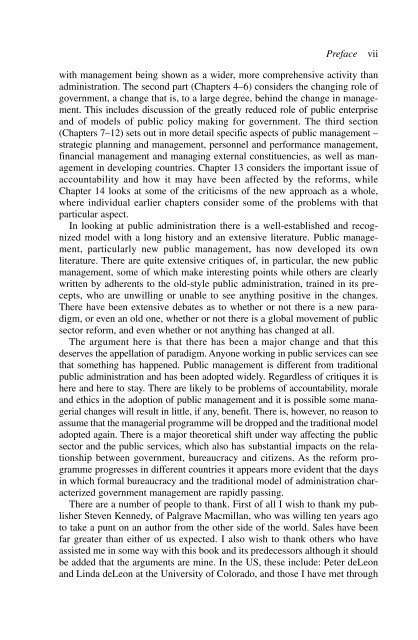Public Management and Administration - Owen E.hughes
Public Management and Administration - Owen E.hughes
Public Management and Administration - Owen E.hughes
You also want an ePaper? Increase the reach of your titles
YUMPU automatically turns print PDFs into web optimized ePapers that Google loves.
Preface vii<br />
with management being shown as a wider, more comprehensive activity than<br />
administration. The second part (Chapters 4–6) considers the changing role of<br />
government, a change that is, to a large degree, behind the change in management.<br />
This includes discussion of the greatly reduced role of public enterprise<br />
<strong>and</strong> of models of public policy making for government. The third section<br />
(Chapters 7–12) sets out in more detail specific aspects of public management –<br />
strategic planning <strong>and</strong> management, personnel <strong>and</strong> performance management,<br />
financial management <strong>and</strong> managing external constituencies, as well as management<br />
in developing countries. Chapter 13 considers the important issue of<br />
accountability <strong>and</strong> how it may have been affected by the reforms, while<br />
Chapter 14 looks at some of the criticisms of the new approach as a whole,<br />
where individual earlier chapters consider some of the problems with that<br />
particular aspect.<br />
In looking at public administration there is a well-established <strong>and</strong> recognized<br />
model with a long history <strong>and</strong> an extensive literature. <strong>Public</strong> management,<br />
particularly new public management, has now developed its own<br />
literature. There are quite extensive critiques of, in particular, the new public<br />
management, some of which make interesting points while others are clearly<br />
written by adherents to the old-style public administration, trained in its precepts,<br />
who are unwilling or unable to see anything positive in the changes.<br />
There have been extensive debates as to whether or not there is a new paradigm,<br />
or even an old one, whether or not there is a global movement of public<br />
sector reform, <strong>and</strong> even whether or not anything has changed at all.<br />
The argument here is that there has been a major change <strong>and</strong> that this<br />
deserves the appellation of paradigm. Anyone working in public services can see<br />
that something has happened. <strong>Public</strong> management is different from traditional<br />
public administration <strong>and</strong> has been adopted widely. Regardless of critiques it is<br />
here <strong>and</strong> here to stay. There are likely to be problems of accountability, morale<br />
<strong>and</strong> ethics in the adoption of public management <strong>and</strong> it is possible some managerial<br />
changes will result in little, if any, benefit. There is, however, no reason to<br />
assume that the managerial programme will be dropped <strong>and</strong> the traditional model<br />
adopted again. There is a major theoretical shift under way affecting the public<br />
sector <strong>and</strong> the public services, which also has substantial impacts on the relationship<br />
between government, bureaucracy <strong>and</strong> citizens. As the reform programme<br />
progresses in different countries it appears more evident that the days<br />
in which formal bureaucracy <strong>and</strong> the traditional model of administration characterized<br />
government management are rapidly passing.<br />
There are a number of people to thank. First of all I wish to thank my publisher<br />
Steven Kennedy, of Palgrave Macmillan, who was willing ten years ago<br />
to take a punt on an author from the other side of the world. Sales have been<br />
far greater than either of us expected. I also wish to thank others who have<br />
assisted me in some way with this book <strong>and</strong> its predecessors although it should<br />
be added that the arguments are mine. In the US, these include: Peter deLeon<br />
<strong>and</strong> Linda deLeon at the University of Colorado, <strong>and</strong> those I have met through











